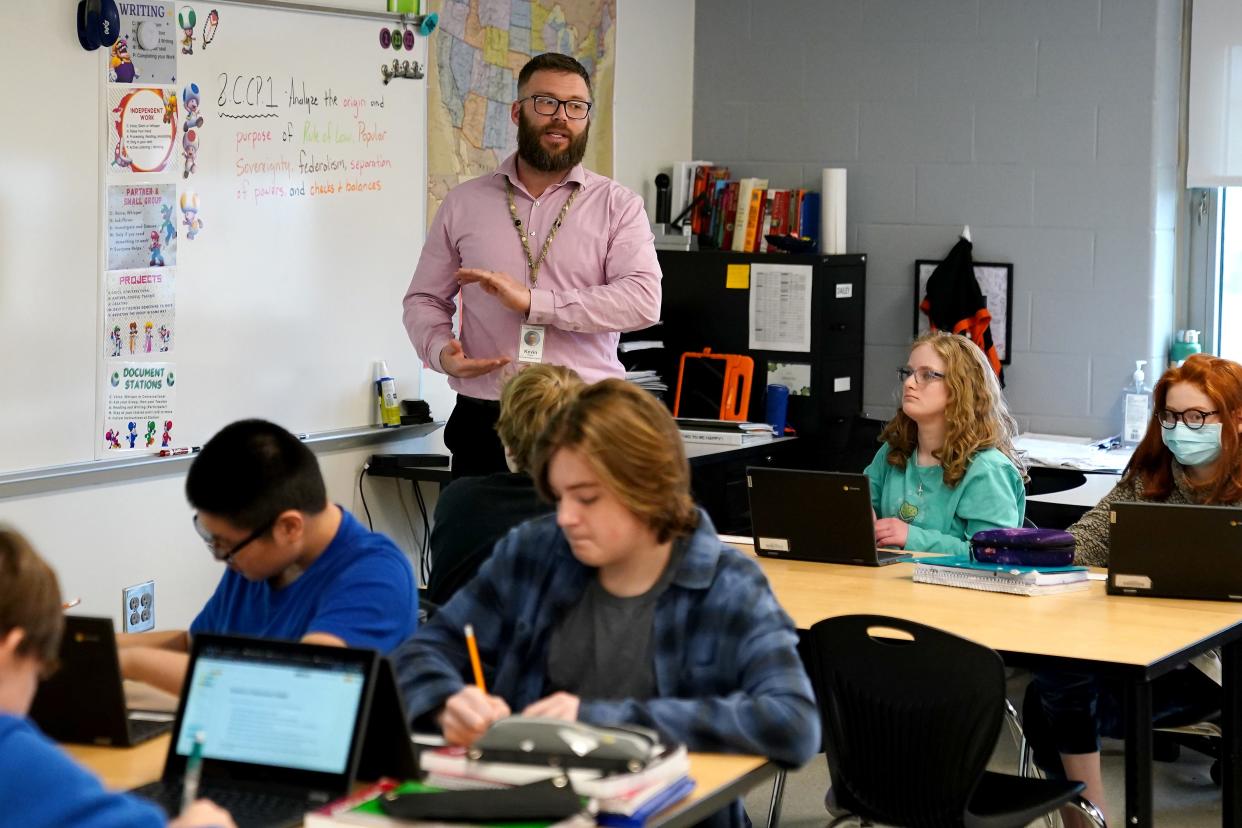Opinion: Civics, history education can secure our democracy

A famous tale about Benjamin Franklin goes as follows: Franklin was walking out of Independence Hall after the Constitutional Convention in 1787, when someone shouted out, "Doctor, what have we got? A republic or a monarchy?" Franklin supposedly responded with, "A republic, if you can keep it."
The findings of a recent survey should cause the American people to take heed as it relates to Franklin’s answer. A new Quinnipiac University poll found that 69% of Democrats and 69% of Republicans say that our democracy is "in danger of collapse."
To keep, as Franklin ominously warned, our republic together, the pressing question that Americans need to answer is, what are the solutions to strengthen our democracy?
An answer may reside in a recent federal bill with bipartisan support, The Civics Secures Democracy Act. This bill prioritizes the K-12 teaching of American history and civics and reverses the historic underfunding of these subjects. Further, it encourages the more frequent use of the National Assessment of Educational Progress and the valuable data it yields, and supports fellowship programs that strengthen and diversifies the teaching corp.
By educating the K-12 students of today with a meaningful civic and history education, our democracy of tomorrow may function with a sense of civility, respect for various viewpoints, and willingness to compromise in finding viable solutions. It is critical that each generation learn the practice of democracy and a civic sense of duty to its principles.The Ohio Council for the Social Studies, Ohio’s largest organization of history and social studies teachers, strongly supports the passage of this transformational bill.
The language in The Civics Secures Democracy Act outlines the following components:
Grants to states ($585 million annually for five years) to support education in American civics and history. States that receive grants must use not less than 95% of the funds to make sub-grants to school districts to assist local education agencies in carrying out programs to improve the achievement of elementary and secondary school students in the fields of American civics and history.
Support for qualified nonprofit organizations ($200 million annually for five years), through competitive grants, to assist such organizations in developing or expanding access to civics curricula, instructional models, and other educational programs to enhance student knowledge and achievement in American civics and history in elementary schools and secondary schools.
Resources for institutions of higher education ($150 million annually for five years), on a competitive basis, to assist such institutions in developing and implementing programs to train elementary and secondary school teachers in methods for engaging students in American civics and history.
CSDA funding and grants would give priority to proposals and programs focused on traditionally underserved populations.
How would the passage of the Civics Secures Democracy Act impact Ohio’s K-12 students? The possibilities of building historical appreciation, cultural awareness, and civic pride in the Buckeye State are endless. There could be field trips to various museums and historical destinations in Ohio: Campus Martius in historic Marietta, the National Underground Railroad Freedom Museum in Cincinnati, The Air Force Museum in Fairborn, the Neil Armstrong Air and Space Museum, the Toledo Museum of Art, the Hopewell Ceremonial Earthworks (in the process to become a World Heritage Site) or the Sojourner Truth Project, under construction in Akron.
Students' sense of Buckeye Pride would grow with field studies of the homes and museums of Ohio’s great inventors: The Wright Brothers, Thomas Edison, Granville Woods, and Charles Kettering.
Students would have the opportunities for case studies and trips to the homes or museums of one of the seven presidents born in Ohio. There would be funding for more students to participate in History Day, sponsored by Ohio History Connections. Also, opportunities to learn the stories of Ohio courts and the men and women who shaped them followed with a field trip to the Ohio Supreme Court.
Further, students would have learning opportunities in the important area of civic participation and economics by involvement in programs from the Ohio Center for Law-Related Education, such as Ohio Mock Trial, Project Citizen, We the People and Youth for Justice, and the Federal Reserve, offering outstanding field trips to their Cleveland office and Cincinnati branch.
The Civics Secures Democracy Act would provide Ohio’s K-12 students, and students across this country, with unique learning opportunities in civics and history with the goal of having them become informed and engaged participants in our democratic republic.
For more information about this bill, please go to the following website: https://civxnow.org/our-work/federal/. The Ohio Council for the Social Studies encourages all Ohioans to contact their U.S. Representatives and U.S. Senators in support of the Civics Secures Democracy Act.
James F. O’Connor is a Social Studies teacher at Princeton High School and president of the Ohio Council for the Social Studies.
This article originally appeared on Cincinnati Enquirer: Opinion: Civics, history education can secure our democracy

